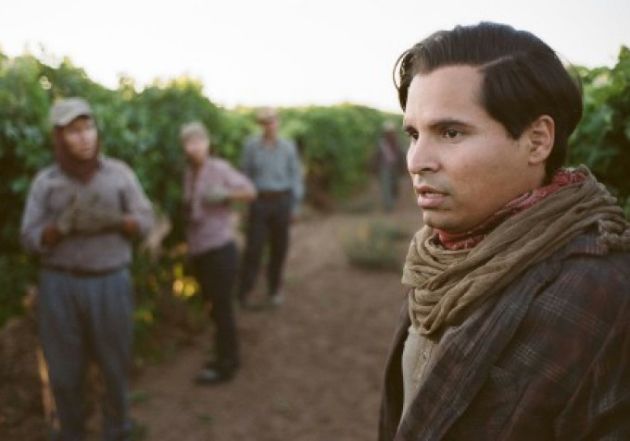
I gotta admit that I was very skeptical going into this movie. There is something very dreadful about patronizing Hollywood biopics that makes me shudder. But with its largely Mexican-American cast and Mexican actor-turned-director Diego Luna (Y Tu Mama Tambien, Milk) directing, and for the fact it's the first biopic on Chavez, one of the most important labor activists in American history, I thought I'd give it a go. Surprisingly, Luna does an amazing job here, wisely concentrating on Chavez's biggest accomplishment in mid 60s through 70s -- as he goes back working in the field to organize, to the great California grapes strike, to hunger strikes to end violence on both sides. He doesn't whitewash his subject. Chavez's constant absence takes a toll on his family. Direct and uplifting without being patronizing, the film does justice to its subject. Chavez is a loving tribute to an uphill battle that is not won yet.
Cesar Chavez, a civil rights leader, labor activist, co-founder of United Farm Workers Union (UFW) and the shining example of non-violent protests, is beautifully embodied by Michael Peña (The End of Watch, American Hustle). His Chavez is a no-nonsense, effective organizer, who also struggled at being a good dad: Chavez's warmth, strength and all-too-humanness is made palpable by his performance. America Ferrera is great as Helen Chavez, mother of their 8 children but also a fearless organizer and the backbone of the family. Rosario Dawson plays Dolores Huerta, a labor leader who co-founded National Farmworker's Association (which later became UFW) with Chavez. She plays it straight in a supporting role, not overshadowing anyone from the great ensemble cast, including John Malkovich (also serves as executive producer) as the main adversary of the struggle, the rich farm owner Bogdanovitch.
The controversy surrounding Chavez about urging deportation of undocumented workers who were brought in across the border as scabs by rich American farmers is not really explored in the film. However, there are scenes where Chavez and his strikers encouraging Mexican children who were brought in as scabs to join the union. These are bits and pieces of American history we don't learn in school. One thing critics should understand is that Chavez wanted to organize all workers and didn't want to see those workers, either documented or undocumented, who weren't in the Union, get exploited. I mean, that's the whole point of the Union.
The film's timely release (also coincides with Chavez's birthday 3/31), as the country's immigration law still tied up in the Congress and the existence of Labor Union being assaulted by politicians and large companies every single day, will hopefully revitalize the public's consciousness on these important matters. The kicker is, the struggle is not won for the farm workers, they are still at it after 50 years since Chavez began his work.
Cesar Chavez illuminates the small victories of these workers and reminds us what was possible before to overcome injustice and gives us hope that it is possible again in the future.
Cesar Chavez made its debut at SXSW and is coming to theaters on 3/28. For more information, visit Participant Media website.
No comments:
Post a Comment